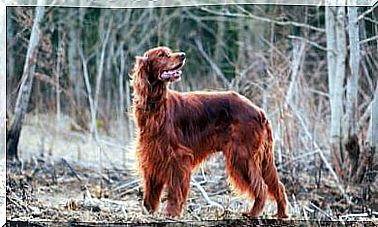4 Benefits Of Tea Tree Oil For Dogs

Did you know that tea tree oil can be beneficial for dogs? It is a botanical product commonly sold in health food stores. It is an extract from the leaves of the Australian tea tree ( Melaleuca alternifolia ). This tree species does not grow naturally outside Australia.
The tree belongs to the Myrtacea family . In this family, there are also eucalyptus and myrtle. Due to its lipophilic (oily) nature, tea tree oil is easily absorbed by the skin. Also, like eucalyptus oil, tea tree oil has a strong smell.
In this context, medicinal herbs, including this oil, are becoming more common in pet care. After all, people are looking for more and more natural products for themselves and their pets.

Tea tree oil, a potent antimicrobial ally
This plant was used by sailors to make tea with nutmeg. Today, using the plant to make tea is quite unusual. After all, it is processed to extract tea tree oil.
Its powerful properties have been linked to a long list of compounds. The most prominent is a compound called terpinen-4-ol, which is in high concentrations in this substance. This compound has powerful antibacterial, antifungal, antiviral and antiprotozoal activity.
1. Use of oil as an antibacterial
Of all the properties of this oil, its antimicrobial activity is undoubtedly the one that has received the most attention. To date, scientific reports clearly show that the oil’s broad-spectrum activity includes antibacterial effects.
However, not all activities were well characterized, but the data are promising.
Furthermore, its antibacterial activity against antibiotic resistant bacterial strains has been demonstrated. This is the case for methicillin- resistant Staphylococcus aureus (MRSA), which has received the most attention so far.
In this context, it has been shown that this vaporized oil can inhibit bacteria that cause respiratory diseases.

2. Use of tea tree oil in the oral health of dogs
In recent years, there has been an increase in medical care costs, serious side effects and drug resistance for clinical use. Thus, many pet owners are looking for alternative medications to treat periodontal diseases.
As in humans, periodontal disease in dogs and cats can be treated with four goals.
The first is to eliminate accumulated plaque and tartar. In addition, the focus may be on fighting bacteria that cause infections. Finally, reducing inflammation and stopping bleeding are also treatment goals. Tea tree oil showed effectiveness in the first three tasks.
The M. alternifolia has bactericidal and bacteriostatic effects against the most prevalent oral pathogens. In addition, M. alternifolia also showed antioxidant properties, beneficial to the patient, as they reduce the inflammatory responses caused by pathogens.
3. Antifungal use of this oil in dogs
The yeast Malassezia pachydermatis is part of the normal skin flora of most warm-blooded organisms. This yeast species can be involved in different skin diseases, such as seborrheic dermatitis, especially in dogs and cats.
Furthermore, it is also commonly involved and can perpetuate inflammatory reactions in the ear canal.
To find an alternative therapeutic agent, several expert groups examined tea tree oil activity. These researchers found that Malassezia pachydermatis is highly susceptible to this oil.
In clinical trials, the treatment of otitis externa in dogs using a lotion with 5% tea tree essential oil showed comparable efficacy to treatment with nystatin, with no adverse reactions.
4. Treatment of dermatitis in dogs with tea tree
There is evidence that 10% tea tree oil is powerful as an anti-inflammatory treatment. This effect makes it a valid option for the treatment of acute and chronic localized pyoderma.
In addition, there is the effectiveness, mentioned above, in combating other microorganisms associated with itchy skin lesions.
Safety and toxicity
Properly applied (and in diluted form) to pets, this oil can be very effective in treating and preventing bacterial, fungal or yeast infections.
Due to its effectiveness, this oil is found in many pet care products in different concentrations.
Tea tree oil is an excellent anti-inflammatory. Therefore, it helps to reduce skin inflammation that can cause itchiness and irritation. It also has excellent antibacterial, antiviral and antifungal properties that can help prevent and treat many skin problems.
How to administer tea tree oil to your dog?
You should keep in mind that tea tree oil can be toxic if swallowed. Therefore, oral administration is contraindicated.
As for dermal toxicity, the oil can cause allergic reactions if applied concentrated. Therefore, it is necessary to apply it topically or in appropriate dilutions. Also, many commercial products contain a diluted amount of this oil.
As with any product, always seek your veterinarian’s advice before applying the oil to your dog. Finally, this oil should not be used on cats; so be careful when applying it if you have cats at home.









